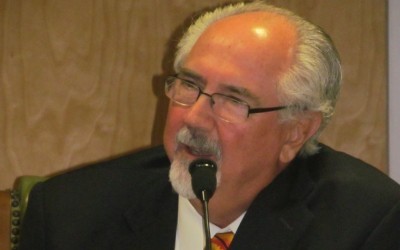Mineola residents came out in show of force Wednesday night to support the village board in its pending court fight against 7-Eleven.
“The 7-Eleven petition must be rejected,” Mineola resident Bill Plunkett said during the board’s regularly scheduled meeting. “Appeasement is not the issue. We are relieved and gratified for the board’s responsible conduct. Our homes are not whims.”
Plunkett called 7-Eleven’s application for a store at 400 East Jericho Turnpike “flawed” and said it “should be rejected,” drawing loud applause from residents attending the meeting.
7-Eleven filed a lawsuit against Village of Mineola on April 18, charging that the village board acted in an “arbitrary and capricious” manner in rejecting the company’s application on March 14. The board had acted on its own “whims” rather than substantive reasons to “appease residents,” the company contended in documents filed with the court.
“We’re going to defend the lawsuit as best as we possibly can,” Mineola Mayor Scott Strauss told the residents.
When one resident asked whether there would be a hearing in open court, village attorney John Spellman said the litigation would consist of “paper responses” between the opposing attorneys.
“The judge reads the information and makes a decision,” Spellman said, adding that he expected an initial decision in the case in four months.
“We’re going to defend it zealously,” Spellman said, recounting a similar case the village board won 10 years ago against the convenience store giant.
One woman asked whether Mineola Trustee Lawrence Werther’s prior public comments the issue had precipitated the suit.
“I can tell you that with respect to this board, there has never been a decision made in the back room,” Spellman responded. “And that’s true of the previous administration.”
At the meeting in which the board voted unanimously voted against accepting the 7-Eleven application, Werther made a statement repeated in the 7-Eleven court papers.
“The only reason that 7-Eleven is before us here is because they are serving food,” the company’s filing quotes Werther saying. “There are a number [of] ‘as of right’ uses that building could be constructed to do. If the same deliveries, same amount of deliveries, the same amount of vehicular traffic were there for hardware or shoes, we wouldn’t have a say in the matter whatsoever.”
Werther said last week that the lawsuit would have been filed whether he warned his fellow board members about it or not.
“We need to bring all arguments, all discussions before the public all the time. We can’t make decisions in the back room,” Werther said. “Mr. Amato would have filed that Article 78 if we sat here and just smiled.”
Werther said at a recent meeting of the New York Conference of Mayors and Municipal Officials, the organization’s general counsel, Wade Beltramo, called the Mineola board’s procedures “problematic” in response to a question he posed. Werther said he had e-mails with Beltramo as proof of the general counsel’s opinion.
“I happen to be your attorney,” Spellman said, “so it would be nice once in a while if you told me if you had a question.”
Mineola Deputy Mayor Paul Pereira said he objected to having his character called into question by Werther’s “back-room” comment.
“I’ve never made any decision, I’ve never voted on anything but right here where we are,” Pereira said.
Mineola resident Julie Calahan asked Spellman if residents had hampered the case against 7-Eleven in their public comments at a hearing preceding the board’s vote on the application.
“No,” Spellman said, adding, “The good thing about this country and this village is you can say anything you want.”
Mineola resident Dennis Walsh asked if Werther’s e-mails with the attorney for the conference of mayors and municipal officials could be accessed by a request under the Freedom of Information Law since Werther had referred to them in a public forum.
“Any communication undertaken by a recognized officer are available under FOIL,” said Spellman.
In a telephone interview after the meeting last week Werther said e-mails had been used by board members to make decisions on issues prior to public meetings.
“There have been numerous instances when e-mails have been shot around and things get done that way,” Werther said.
He also charged that Spellman had been “fronting” for Polimeni International in its application on the Churchill, the senior housing companion to the Winston apartment project. Werther said Spellman had recommended board members attend meetings with Polimeni representatives “on a less than quorum basis” last June when Polimeni was seeking to change the status of the Churchill from a condominium to an apartment complex.
“Anything that needs to be said to me will be said in an open meeting,” Werther said.
Spellman declined to comment on Werther’s comments regarding Polimeni
Strauss said he aware of the e-mails and simply wanted his board members to be informed about the pending Polimeni application change.
“This is an important project. All I wanted to do was give my fellow board members the same access I have to those people,” Strauss said.
Strauss said exchanging information by e-mail was an efficient means of communicating between meetings.
“Nothing will ever get done if we have to wait a week or two weeks until the next meeting to talk about things,” he said.



